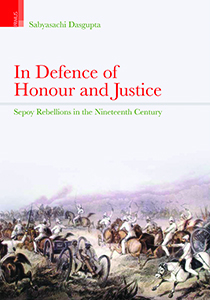
INFORMATION
- AUTHOR : Sabyasachi Dasgupta
- HB ISBN : 978-93-84082-06-2
- PB ISBN : 978-93-5290-308-5
- HB Year : 2015 , PB Year : 2019
- Extent : x + 144 pp.
- Discount available on checkout
- Usually dispatched within 3 to 5 working days.
In Defence of Honour and Justice
| HB
₹795 . $ . ₤ |
PB
₹ . $ . ₤ |
|
| POD
₹ . $ . ₤ |
e-Book
₹ . $ . ₤ |
INFORMATION
- AUTHOR – Sabyasachi Dasgupta
- ISBN – 978-93-84082-06-2
- Year – 2015
- Extent: 400 + 40 coloured illustrations
- 10% discount + free shipping
- Usually dispatched within 3 to 5 working days.
In Defence of Honour and Justice focuses on the ‘sepoy’ rebellions of the nineteenth century as an entry point into the wider dynamics of the pre-1857 colonial armies. Delving beyond the usual binaries of discipline and indiscipline, which tend to draw a linear teleology between the localized mutinies in the colonial armies and 1857, it seeks to explore the broader issues these mutinies raise about the colonial armies, and issues like the prevalence of certain notions of honor and justice among the ‘sepoys’, contrasting
conceptions of discipline, structures of deference, the construction of colonial stereotypes and their influence on policy decisions, etc. These indices were linked to broader questions of loyalty and the construction of a distinct ‘sepoy’ identity.
The actual modus operandi of the colonial project to produce a loyal ‘sepoy’ was complex, contradictory, involved regional variations and was continuously mediated by the ‘sepoys’. These various mutinies can be read as violent interventions by the sepoys to renegotiate the indices around which the company armies sought to build a ‘sepoy’ identity. Finally, this volume suggests that the colonial endeavor of ensuring a loyal ‘sepoy’ could be a bitterly contested one even in the absence of mutinies and could revolve around instances of day to day conflicts.
The Author
Sabyasachi Dasgupta is an Assistant Professor at the Department of History, at Visva-Bharati, Santiniketan. His core area of research is the colonial Indian army.
In Defence of Honour and Justice focuses on the ‘sepoy’ rebellions of the nineteenth century as an entry point into the wider dynamics of the pre-1857 colonial armies. Delving beyond the usual binaries of discipline and indiscipline, which tend to draw a linear teleology between the localized mutinies in the colonial armies and 1857, it seeks to explore the broader issues these mutinies raise about the colonial armies, and issues like the prevalence of certain notions of honor and justice among the ‘sepoys’, contrasting
conceptions of discipline, structures of deference, the construction of colonial stereotypes and their influence on policy decisions, etc. These indices were linked to broader questions of loyalty and the construction of a distinct ‘sepoy’ identity.
The actual modus operandi of the colonial project to produce a loyal ‘sepoy’ was complex, contradictory, involved regional variations and was continuously mediated by the ‘sepoys’. These various mutinies can be read as violent interventions by the sepoys to renegotiate the indices around which the company armies sought to build a ‘sepoy’ identity. Finally, this volume suggests that the colonial endeavor of ensuring a loyal ‘sepoy’ could be a bitterly contested one even in the absence of mutinies and could revolve around instances of day to day conflicts.
The Author
Sabyasachi Dasgupta is an Assistant Professor at the Department of History, at Visva-Bharati, Santiniketan. His core area of research is the colonial Indian army.




